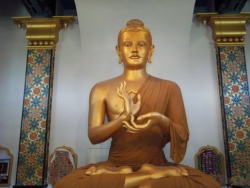Difference between revisions of "God in Buddhism"
| (2 intermediate revisions by the same user not shown) | |||
| Line 1: | Line 1: | ||
[[File:626-1000.jpg|thumb|250px|]] | [[File:626-1000.jpg|thumb|250px|]] | ||
| − | Buddhism is generally regarded as a nontheistic religion. Although it does teach the existence of | + | Buddhism is generally regarded as a nontheistic [[religion]]. Although it does teach the [[existence]] of “[[gods]]” ([[devas]]), these are merely [[heavenly beings]] who temporarily dwell in [[devaloka]] [[celestial]] [[worlds]] of great [[happiness]]. Such [[beings]], however, are not [[eternal]] in that [[reincarnation]] incarnational [[form]] and are [[subject]] to [[death]] and eventual [[rebirth]] ([[Buddhist]]) [[rebirth]] into [[lower realms]] of [[existence]]. However, a distinction needs to be drawn between the seemingly non-deistic and [[non-theistic]] teachings of the [[Buddha]] in the [[Pali Canon]] and the “[[Hindu]] [[Agamas]] [[agamas]]”, and the mystically-hued [[ideas]] attributed to the [[Buddha]] in some [[Mahayana sutras]] and [[Tantras]], where expression is given to an apparent [[Ultimate]] Ground of all things - the immanent, [[omniscient]] and [[transcendent]] [[Reality]] of the [[Awakened]] Mind. |
{{R}} | {{R}} | ||
[http://www.mauspfeil.net/God_in%20Buddhism.html www.mauspfeil.net] | [http://www.mauspfeil.net/God_in%20Buddhism.html www.mauspfeil.net] | ||
[[Category:Buddhist Terms]] | [[Category:Buddhist Terms]] | ||
| − | [[Category: | + | [[Category:Buddhism]] |
| − | [[Category: | + | [[Category:God]] |
Latest revision as of 11:50, 9 September 2013
Buddhism is generally regarded as a nontheistic religion. Although it does teach the existence of “gods” (devas), these are merely heavenly beings who temporarily dwell in devaloka celestial worlds of great happiness. Such beings, however, are not eternal in that reincarnation incarnational form and are subject to death and eventual rebirth (Buddhist) rebirth into lower realms of existence. However, a distinction needs to be drawn between the seemingly non-deistic and non-theistic teachings of the Buddha in the Pali Canon and the “Hindu Agamas agamas”, and the mystically-hued ideas attributed to the Buddha in some Mahayana sutras and Tantras, where expression is given to an apparent Ultimate Ground of all things - the immanent, omniscient and transcendent Reality of the Awakened Mind.
